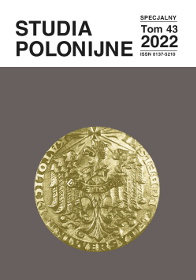Polacy w Irlandii wobec stanu wojennego w Polsce. W latach 1981-1983
Main Article Content
Abstrakt
Akcja „Pomocy dla Polski” w czasie stanu wojennego przeprowadzona została przez członków Towarzystwa Irlandzko-Polskiego przy współpracy irlandzkiego Kościoła katolickiego, Komisji Charytatywnej Episkopatu Polski, statków polskich linii oceanicznych, irlandzkich agencji transportu, firm farmaceutycznych i spożywczych, a przede wszystkim dzięki hojności irlandzkiego społeczeństwa. Mała polska społeczność w krótkim okresie czasu zdołała zebrać niewyobrażalną kwotę pieniędzy, produktów żywnościowych i lekarstw. Podczas 18 miesięcy na zebrano 250,000 funtów w gotówce i zgromadzono różnego rodzaju produkty na kwotę 300,000 funtów. Następnie w 20 kontenerach przetransportowano je statkami do Polski. Oddzielną sumę 50,000 funtów ofiarował także irlandzki rząd, do dalszej dystrybucji przez Irlandzki Czerwony Krzyż i organizację charytatywną Trocaire. Olbrzymim wysiłkiem udało się wpłynąć na irlandzkich polityków, aby zdecydowali się na oficjalne potępienie wprowadzenia stanu wojennego w Polsce. Towarzystwo Irlandzko-Polskie przekształciło się silną i zwartą organizację polonijną, będącą jedynym głosem Polaków w Irlandii i efektywną grupą nacisku. Dali się także poznać jako oddani sprzymierzeńcy ich dalekiej ojczyzny, świadomi swojej tożsamości i potencjału.
Article Details
Bibliografia
Dobrzyńska-Cantwell K., An Unusual Diplomat. Dobrzyński Biography, London: Polish Cultural Foundation 1998.
Doherty G., The First Polish Students in University College Cork and the Irish Polish Society, “The Irish Polish Society Yearbook” 8(2021), pp. 38-44.
Doherty G., Ireland, Europe and the Provision of Food Aid to Poland 1980-81, “Irish Studies in International Affairs” 24(2013), pp. 291-309.
Dolan E., Irish Polish Society Chairpersons in years 1979-2016, “The Irish Polish Society Yearbook” 3(2016), p. 168.
Dowling H., Polish immigrants in 20th century Ireland, [in:] Polish Emigration in Ireland in the 20th and early 21st Centuries, ed. J. Płachecki, Dublin–Żyrardów: Wyższa Szkoła Rozwoju Lokalnego 2012, pp. 19-30.
Johnston H., Early days of the Irish Polish Society, “The Irish Polish Society Yearbook” 7(2020), pp. 163-202.
Kałuski M., Śladami Polaków po świecie, Fribourg: Polonicum Machindex Institut 2008, e-book.
Lyons J., Lecture in University of Cork: ‘Solidarity. A Retrospective’, “The Irish Polish Society Yearbook” 5(2018), pp. 158-161.
Płachecki J., A Timeline of Diplomatic Relations, [in:] Polish Diplomacy in Ireland, ed. J. Płachecki, Dublin: Ognisko Polskie CLG 2021.
Płachecki J., The only Polish House in Ireland, [in:] ed. J. Płachecki, The Polish House in Ireland Dublin. An Illustrated Chronicle, Dublin: Ognisko Polskie CLG 2019.
Quigley P., ‘If I haven’t got a story, I’ll make one’. Jan Kamiński in Trinity College, “The Irish Polish Society Yearbook” 8(2021), pp. ????
Quigley P., The Polish Irishman. The Life and Times of Count Casimir Markievicz, Dublin: Liffey Press, Raheny 2012.
Rules of the Irish Polish Society, “The Irish Polish Society Yearbook” 2(2015), pp. 223-225.
Skolimowski J., Lusiński C., Ireland and Poland. Common Perspectives, Dublin: Embassy of the Republic of Poland 2001.
Stochla S., ‘The Girl-Guide Must Act’ – an Interview with Dr Janina Lyons, “The Irish Polish Society Yearbook” 5(2018), pp. 81-96.
Wheeler M., The woman known as Countess Markievicz, “Tygiel Kultury”, 1998, no. 1-2, pp. 5-15.

